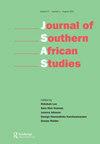后种族隔离时代的白人与忘却种族主义
IF 0.7
4区 社会学
Q2 AREA STUDIES
引用次数: 0
摘要
人们的婚礼歌曲是由Petrus Angula Mbenzi精心介绍给我们的。酷炫的表演性写作(这个词几乎已经解释清楚了)、生态批评、多种表现形式的女性写作、游戏写作——本集涵盖的主题,与前一卷相结合,似乎没有遗漏任何内容。然而,第三卷已经在路上了。显然,纳米比亚文学是一口非常深的井,尽管这些编辑们已经喝足了水,但他们并没有把水喝干。本文章由计算机程序翻译,如有差异,请以英文原文为准。
Post-apartheid whiteness and unlearning racism
people’s wedding songs are observantly introduced to us by Petrus Angula Mbenzi. Queer performative writing (the term is almost explained), ecocriticism, women’s writing in several manifestations, playwriting – the topics covered in this collection, when coupled with its predecessor volume, seem to leave nothing out. Yet Volume 3 is already on its way. Clearly, Namibian literature is a very deep well and, though these editors have quaffed amply of its waters, they have by no means drunk it dry.
求助全文
通过发布文献求助,成功后即可免费获取论文全文。
去求助
来源期刊

Journal of Southern African Studies
AREA STUDIES-
CiteScore
1.40
自引率
0.00%
发文量
73
期刊介绍:
The Journal of Southern African Studies is an international publication for work of high academic quality on issues of interest and concern in the region of Southern Africa. It aims at generating fresh scholarly enquiry and rigorous exposition in the many different disciplines of the social sciences and humanities, and periodically organises and supports conferences to this end, sometimes in the region. It seeks to encourage inter-disciplinary analysis, strong comparative perspectives and research that reflects new theoretical or methodological approaches. An active advisory board and an editor based in the region demonstrate our close ties with scholars there and our commitment to promoting research in the region.
 求助内容:
求助内容: 应助结果提醒方式:
应助结果提醒方式:


